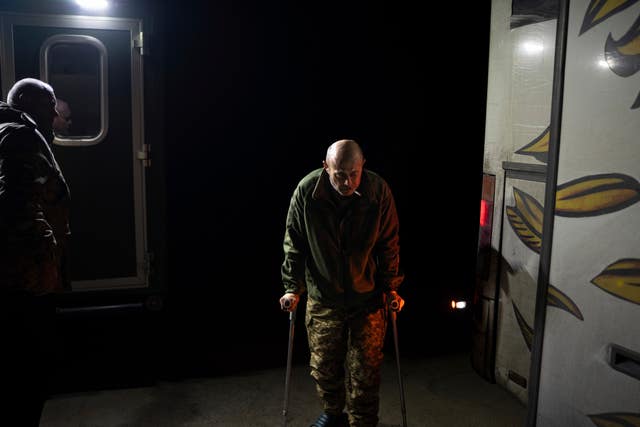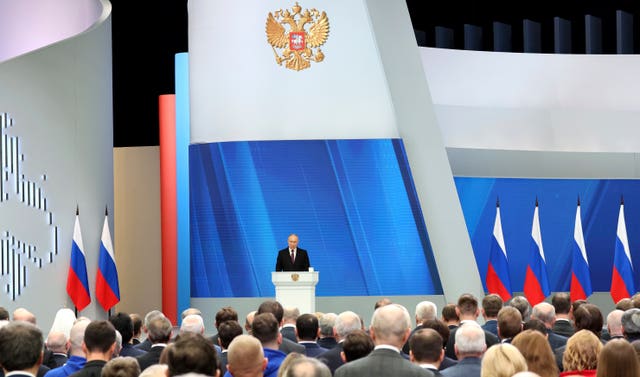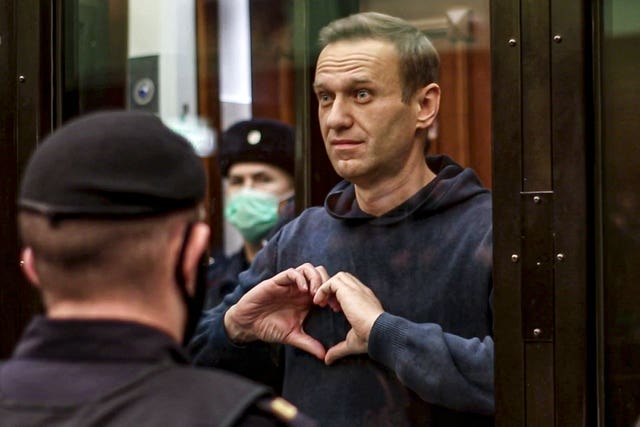Russian President Vladimir Putin has vowed to fulfil Moscow’s goals in Ukraine and warned the West against deeper involvement in the fighting, saying that such a move risks a global nuclear conflict.
Mr Putin’s warning came in a state-of-the-nation address ahead of next month’s election that he is all but certain to win, underlining his attempt to protect Russian gains in Ukraine.
In an apparent reference to French President Emmanuel Macron’s statement earlier this week that the deployment of Western ground troops to Ukraine should not be “ruled out”, Mr Putin warned that it would lead to “tragic” consequences for countries who decide to do that.
Mr Putin noted that while accusing Russia of plans to attack Nato allies in Europe, Western allies were “selecting targets for striking our territory and selecting the most efficient as they think striking assets and talking about the possibility of sending a Nato contingent to Ukraine”.
“We remember the fate of those who sent their troop contingents to the territory of our country,” the Russian leader said. “Now the consequences for the potential invaders will be far more tragic.”

Speaking before an audience of lawmakers and top officials, Mr Putin said the West should keep in mind that “we also have the weapons that can strike targets on their territory, and what they are now suggesting and scaring the world with, all that raises the real threat of a nuclear conflict that will mean the destruction of our civilisation”.
“Don’t they understand it?” he said, alleging that Western leaders are playing with options of deeper involvement in the conflict, as in a simulation. “Those people haven’t been through any tough challenges and they have forgotten what war means.”
Mr Putin emphasised that Russia’s nuclear forces are in “full readiness”, saying that the military has deployed potent new weapons, some of them tested on the battlefield in Ukraine.

The Kremlin leader said they include the new Sarmat heavy intercontinental ballistic missile that has entered service with Russian nuclear forces, along with the Burevestnik atomic-powered cruise missile and the Poseidon atomic-powered, nuclear-armed drone, which are completing their tests.
At the same time, he rejected Western leaders’ statements about the threat of a Russian attack on Nato allies in Europe as “ravings” and again dismissed Washington’s claim that Moscow was pondering the deployment of space-based nuclear weapons.
In his speech that focused heavily on economic and social issues ahead of the March 15-17 presidential vote, Mr Putin argued that Russia was “defending its sovereignty and security and protecting our compatriots” in Ukraine, claiming that the Russian forces have the upper hand in the fighting.
He hailed Russian soldiers and honoured those who were killed in fighting with a moment of silence.
Mr Putin has repeatedly said that he sent troops into Ukraine in February 2022 to protect Russian interests and prevent Ukraine from posing a major security threat to Russia by joining Nato. Kyiv and its allies have denounced it as an unprovoked act of aggression.
The Russian leader has repeatedly signalled a desire to negotiate an end to the fighting but warned that Russia will hold on to its gains.
Mr Putin, 71, who is running as an independent candidate in the March 15-17 presidential election, relies on the tight control over Russia’s political system that he has established during 24 years in power.

Prominent critics who could challenge him have either been imprisoned or are living abroad, while most independent media have been banned, meaning that his re-election is all but assured.
He faces token opposition from three other candidates nominated by Kremlin-friendly parties represented in parliament.
Russia’s best-known opposition leader Alexei Navalny, whose attempt to run against Mr Putin in 2018 was rejected, died suddenly in an Arctic prison colony earlier this month, while serving a 19-year sentence on extremism charges. His funeral is set for Friday.
